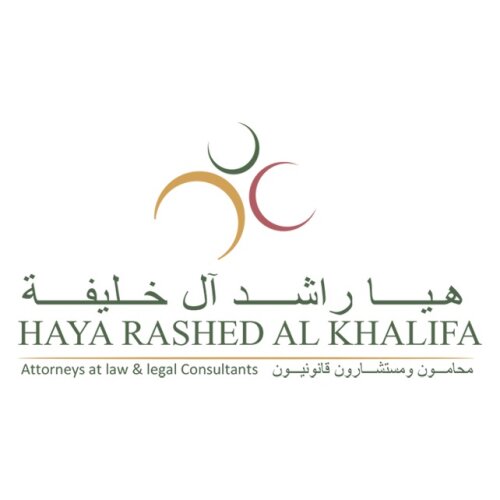Best Tax Increment Financing Lawyers in Bahrain
Share your needs with us, get contacted by law firms.
Free. Takes 2 min.
Or refine your search by selecting a city:
List of the best lawyers in Bahrain
About Tax Increment Financing Law in Bahrain
Tax Increment Financing (TIF) in Bahrain is a financial tool used to fund infrastructure and development projects in specific areas by leveraging the future increase in property taxes that will result from the improvements made. TIF is designed to stimulate economic growth and development in targeted zones, addressing urban blight and enhancing property values with new investments. Although not widely implemented compared to other financial instruments in Bahrain, TIF structures are gaining interest as a viable option for urban and economic development. Understanding the legal framework and implications of TIF in Bahrain is crucial for anyone considering it as a financing strategy.
Why You May Need a Lawyer
Engaging a lawyer when dealing with Tax Increment Financing in Bahrain can be essential for several reasons:
- Understanding Legal Structures: TIF involves complex legal agreements and structures that require expert interpretation and comprehension.
- Negotiating Agreements: Lawyers can assist in negotiating terms with municipalities or government agencies, ensuring that agreements are fair and beneficial.
- Compliance with Regulations: Ensuring that your TIF project complies with national and local regulations in Bahrain is critical to avoid legal pitfalls.
- Litigation Concerns: In instances of disputes over TIF agreements, legal representation is crucial to protect your interests.
- Project Implementation Issues: Lawyers can help navigate any hurdles that arise during the implementation phase of a TIF-funded project.
Local Laws Overview
In Bahrain, the legal landscape for Tax Increment Financing involves several key aspects:
- Regulatory Framework: TIF in Bahrain is subject to specific regulatory oversight to ensure that projects align with broader economic and development goals.
- Government Approvals: Any TIF project requires multiple levels of government approvals, which can vary based on the project's scope and location.
- Zone Designations: TIFs are typically applied in designated development areas, which are identified through governmental planning and policy decisions.
- Financial Projections: Projects must present viable financial growth projections demonstrating increased tax revenues.
- Public Interest Considerations: Projects must be aligned with public interest objectives, ensuring community benefits from the development.
Frequently Asked Questions
What is Tax Increment Financing?
Tax Increment Financing (TIF) is a method used to finance infrastructure improvements and development projects by capturing the future increase in property tax revenues resulting from the project.
Is TIF common in Bahrain?
While not the most common financing mechanism in Bahrain, interest in using TIF is growing as urban development needs increase and alternative financing solutions are sought.
What are the benefits of using TIF?
TIF can provide upfront funding for infrastructure improvements, help eliminate urban blight, increase property values, and generate sustainable economic growth in targeted areas.
Do I need government approval for a TIF project?
Yes, any TIF project in Bahrain requires multiple layers of government approval to ensure alignment with development policies and financial viability.
How is the tax increment calculated?
The tax increment is calculated based on the increase in property tax revenues from the improved property value compared to its original value before development.
Are there any restrictions on how TIF funds can be used?
Yes, TIF funds can typically be used for public infrastructure improvements, land acquisition, and other project-related expenses as defined by the relevant regulations.
Can TIF be used for residential developments?
TIF is usually applied to mixed-use, commercial, or public development projects, but residential components can be included if aligned with broader project goals.
What happens if a TIF project fails to meet financial projections?
If a TIF project fails to meet its financial projections, it may result in a shortfall of expected tax revenues, requiring a review and adjustment of funding strategies.
Do property owners in the TIF district pay more taxes?
Property owners do not pay additional taxes, but the taxes they pay based on increased property values contribute to financing the improvement projects.
Can I challenge a TIF designation or project?
Yes, stakeholders have the right to challenge a TIF designation or project through legal channels if they believe it contravenes local regulations or public interest.
Additional Resources
For those seeking more information or assistance with TIF-related matters in Bahrain, the following resources may be helpful:
- Ministry of Finance and National Economy: Governs financial regulations and policies related to economic development and infrastructure funding.
- Real Estate Regulatory Authority (RERA): Provides oversight and guidelines in the real estate sector, relevant for TIF projects.
- Bahrain Economic Development Board: Offers insights and support for businesses engaged in national economic development initiatives.
- Legal Firms Specializing in Financial Law: Engaging with legal experts who specialize in financial and development law can provide invaluable guidance and support.
Next Steps
If you are considering or involved in a TIF project in Bahrain and require legal assistance, here are the next steps to consider:
- Research Potential Lawyers: Identify law firms or independent lawyers with expertise in TIF and related legal areas.
- Schedule Consultations: Arrange initial consultations to discuss your project's scope and specific legal needs.
- Gather Documentation: Collect and prepare all relevant project documentation, including financial projections and governmental communications.
- Assess Legal Opinions: Evaluate the legal opinions and advice to determine the best course of action for your TIF project.
- Engage Legal Representation: Once you have identified a suitable lawyer, formalize the engagement and start working on necessary legal strategies and compliance checks.
Lawzana helps you find the best lawyers and law firms in Bahrain through a curated and pre-screened list of qualified legal professionals. Our platform offers rankings and detailed profiles of attorneys and law firms, allowing you to compare based on practice areas, including Tax Increment Financing, experience, and client feedback.
Each profile includes a description of the firm's areas of practice, client reviews, team members and partners, year of establishment, spoken languages, office locations, contact information, social media presence, and any published articles or resources. Most firms on our platform speak English and are experienced in both local and international legal matters.
Get a quote from top-rated law firms in Bahrain — quickly, securely, and without unnecessary hassle.
Disclaimer:
The information provided on this page is for general informational purposes only and does not constitute legal advice. While we strive to ensure the accuracy and relevance of the content, legal information may change over time, and interpretations of the law can vary. You should always consult with a qualified legal professional for advice specific to your situation.
We disclaim all liability for actions taken or not taken based on the content of this page. If you believe any information is incorrect or outdated, please contact us, and we will review and update it where appropriate.
Browse tax increment financing law firms by city in Bahrain
Refine your search by selecting a city.

















